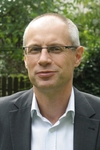
Pawel Machcewicz
Historian, professor at the Institute of Political Studies of the Polish Academy of Sciences in Warsaw; 2018-2019 fellow at the Imre Kertesz Kolleg at the Friedrich-Schiller-Universität in Jena; 2017-2018 fellow at the Wissenschaftskolleg zu Berlin; 2008-2017 – founding director of the Museum of the Second World War in Gdańsk, removed from his post by the Law and Justice government immediately after opening the museum to the public; he has taught at the Warsaw University and the Nicolaus Copernicus University in Toruń and was a co-founder of the Institute of National Remembrance, in 2000-2006 was director of its research and education branch. His many books include Rebellious Satellite: Poland 1956 (2009) and Poland`s War on Radio Free Europe, 1950-1989 (2014) in the Cold War Series of the Woodrow Wilson Center Press and Stanford University Press. He was also editor and co-author of the two-volume series Wokół Jedwabnego [Jedwabne and Beyond], 2002 (the German edition: Der Beginn der Vernichtung. Zum Mord an den Juden in Jedwabne und Umgebung in Sommer 1941. Neue Forschungsergebnisse polnischer Historiker, Fibre, Osnabrück 2004). He also published about politics of history and memory conflicts in Poland and East Central Europe after 1989: Spory o historię 2000-2011 [Historical Battles 2000-2011], 2012. His most recent book (Muzeum, Kraków 2017) describes the history of creating the Museum of the Second World in Gdańsk and controversies it evoked (the German edition: Der umkämpfte Krieg. Das Museum des Zweiten Weltkriegs in Danzig. Entstehung und Streit, Harrassowitz Verlag, Wiesbaden 2018; the English language edition: The War That Never Ends. The Museum of the Second World War in Gdańsk, De Gruyter, Berlin-Boston 2019). Currently he works on a new book: an analysis of the nationalistic and anti-Semitic elements in the ideology of the Polish Communists, which became increasingly important in the 1950s and especially in the 1960s. The book will explore to what extent the ideological evolution of the Communist system in Poland was the reflection and continuation of the deeper, historical patterns in terms of politics, culture and mentality. Comparisons with the nationalist and anti-Semitic discourses in Poland in the 1930s and in the 1940s and also after the fall of the Communism in 1989 will be part of the analysis. The analysis of the nationalist and anti-Semitic ideology of the Polish Communists will be presented as well against a broad comparative background of the other Communist countries: the Soviet Union, Romania, Czechoslovakia and East Germany.

